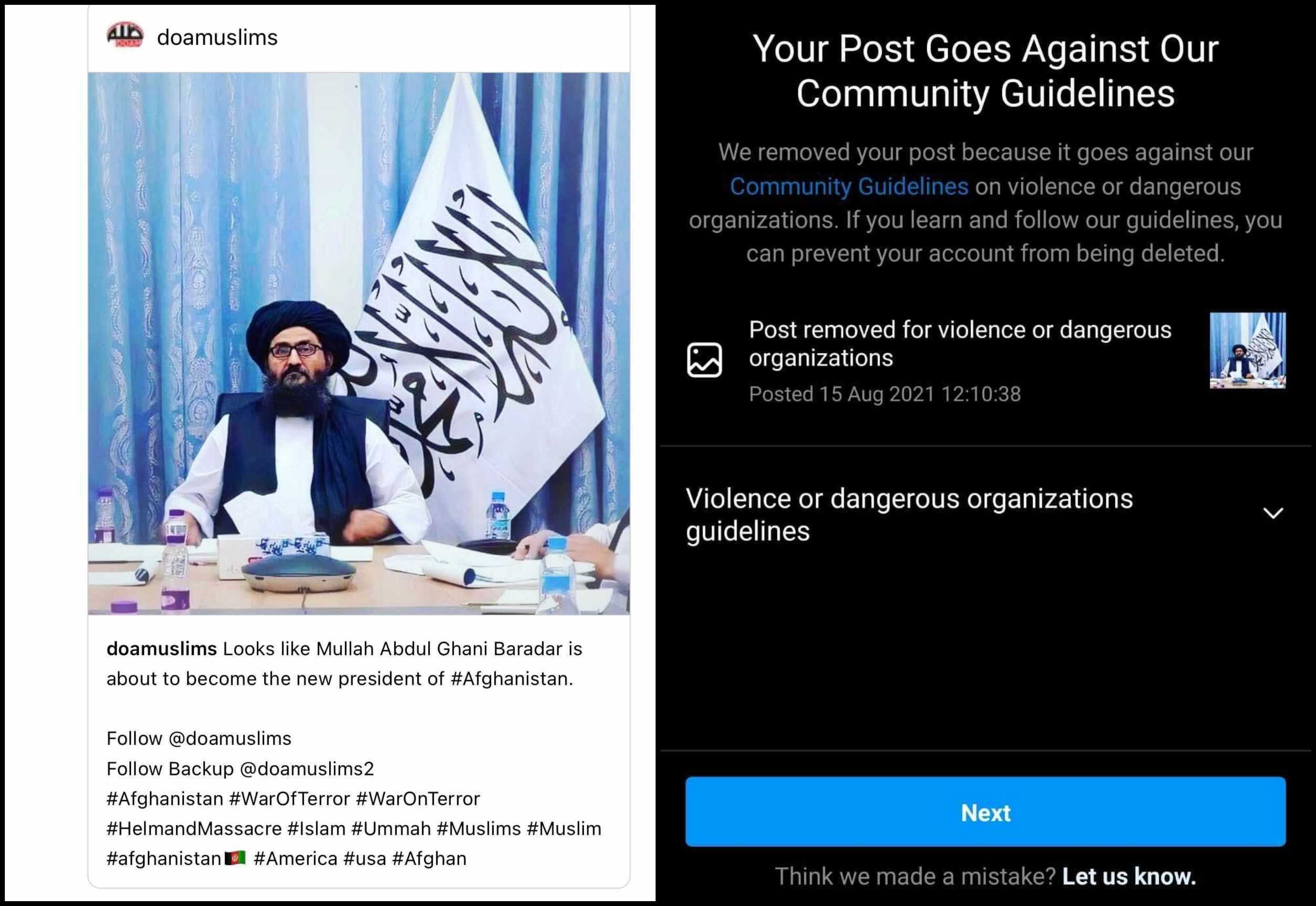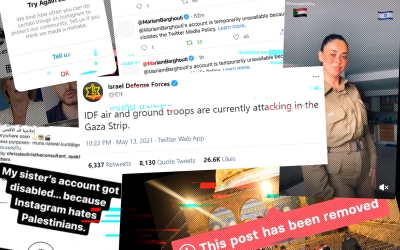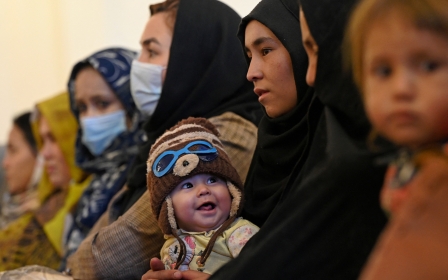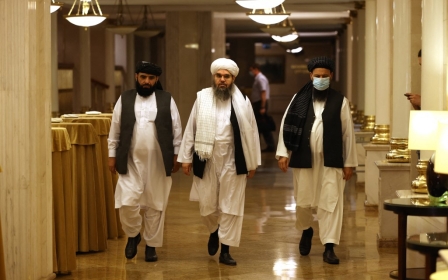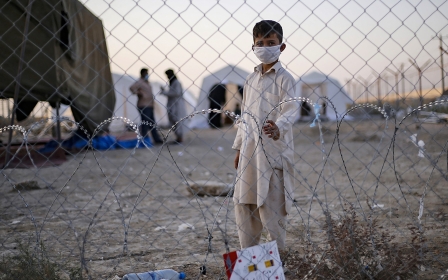Afghanistan: Muslim Instagram users complain about censorship
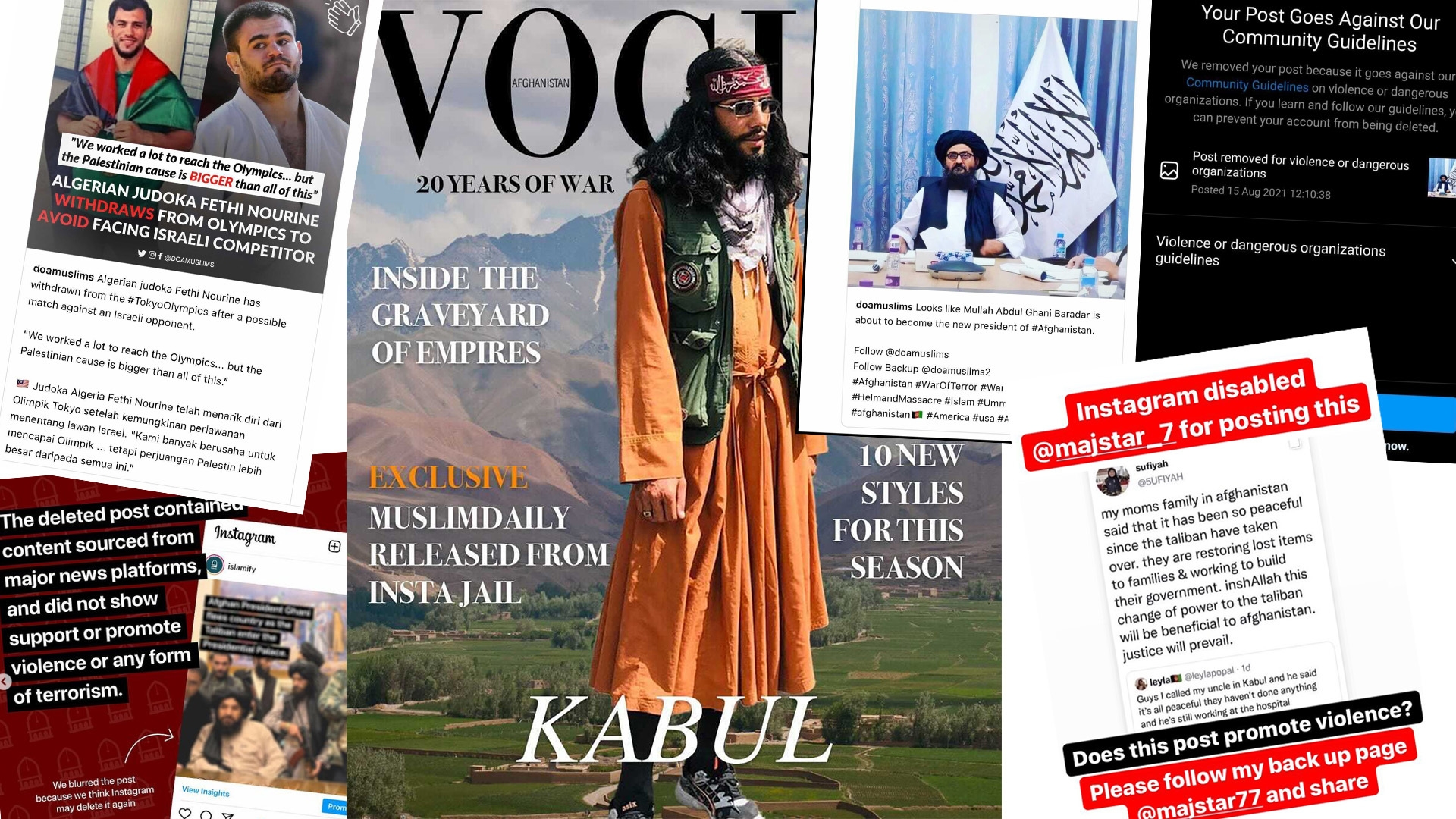
Instagram is facing accusations of censorship over the disabling or removal of content from a number of prominent Muslim accounts over posts related to recent events in Afghanistan and Israel-Palestine.
Several Muslim users of the Facebook-owned social media platform said their accounts had been suspended or had posts about Afghanistan removed in the past two weeks, since the Taliban took control of the Afghan capital, Kabul.
According to messages posted by Instagram on the disabled pages, the content was removed due to breaking "guidelines on violence and dangerous organisations”, prompting concerns that Muslims posting about global affairs were being linked with violence.
Facebook told Middle East Eye on Friday, following publication of this story, that it was restoring two of the suspended accounts after looking into the matter.
'You cannot write the word Taliban'
New MEE newsletter: Jerusalem Dispatch
Sign up to get the latest insights and analysis on Israel-Palestine, alongside Turkey Unpacked and other MEE newsletters
Documenting Oppression Against Muslims (DOAM), a campaign organisation which monitors anti-Muslim acts around the world, had its Instagram account of over 200,000 followers temporarily disabled on 17 August.
On that day, it posted: “Looks like Mullah Abdul Ghani Baradar is about to become the new president of #Afghanistan,” accompanied by a picture of Baradar, one of the Taliban founding fathers, who was set to return to the country after living in exile in Qatar.
The account also posted a widely shared video of members of the Taliban playing in an amusement park.
Both posts were removed because they “went against [Instagram’s] Community Guidelines on violence or dangerous organisations”, and the account was subsequently disabled. It was restored on 20 August.
“You cannot write the word Taliban,” Zahid Akhtar, founder of DOAM, told MEE. “The content is automatically removed after a while, because you’re promoting ‘violence and dangerous organisations’. But we’re just posting the news without commenting. We’re posting what mainstream media, like Al Jazeera and the BBC, are posting.
“What I’ve learned in recent years is that if Muslim organisations like ourselves do this, our content gets censored.”
'Questioning the war on terror'
Muslim Daily, a humanitarian and news account with over 500,000 Instagram followers, was also disabled.
Abrar, the administrator of the account, told MEE that the profile was banned on 16 August, after he posted pictures of the aftermath of the fall of Kabul.
“The posts included some fighters, but also included locals out in the streets. They removed it for 'violence and dangerous organisations',” he said. “But nothing I said was in support of the Taliban.”
Abrar said that he got the account back a few days later, before it was removed again on 19 August, after he posted a meme of a Taliban figure in the form of a cover of Vogue magazine. The same meme had been widely circulated on several social media platforms.
Meanwhile, British humanitarian aid worker Majid Freeman also had his Instagram account suspended.
Freeman said he used his account, which had over 13,000 followers, for humanitarian and political updates, and was particularly active in recent weeks in sharing content related to Afghanistan. The aid worker had around 10 posts taken down.
“The posts weren’t promoting violence or the Taliban, they were questioning the war on terror,” he told MEE, referring to the US-led invasion of Afghanistan in 2001.
His account was disabled shortly after he re-posted a tweet which said that the streets of Kabul were relatively peaceful following the Taliban’s takeover.
“The irony is that a post about peace was taken down for promoting violence.”
Another one of Freeman’s posts which was removed on the basis of violence was a tweet by Ashok Swain, professor of peace and conflict research at Uppsala University in Sweden, which pointed out that the Taliban was not a US-designated terror organisation.
Israel-Palestine posts removed
Islamify, a prominent Instagram account with 1.3m followers, which posts Muslim news and religious content, also complained of censorship by Instagram.
“Instagram has been actively suppressing our account for the last few months, and deleting content using unjust reasons,” it said in a statement on 16 August.
“Our last post on Afghanistan was deleted, with claims that it promotes violence and dangerous organisations, however the content was sourced from major news platforms…”
It added that in July, Instagram had taken down a post that encouraged Muslims to fast on the Day of Arafah (one of the holiest days in the Islamic calendar), on the same basis of contravening guidelines on “violence or dangerous organisations”.
Islamify linked recent instances of censorship with Israel’s May offensive in Gaza, which resulted in the death of at least 260 Palestinians.
“We have been posting for almost 10 years, and not a single post has been deleted, or violated any guidelines up until the last four months, since we have been posting more about the Israeli aggression on Palestine,” it said.
“This is when we noticed our engagements being reduced, and content being actively deleted.”
DOAM has faced similar issues with posts related to Israel-Palestine. It posted a news item last month about an Algerian judoka withdrawing from the Olympics in anticipation of facing an Israeli opponent, in solidarity with the Palestinian cause. The post was removed by Instagram, which again linked it with violence.
Akhtar said that in May, DOAM’s content was regularly removed and its account was temporarily disabled after it reported on the Israeli bombardment of Gaza and crackdowns on protesters.
MEE reported at the time on activists facing censorship and content removal after posting about forced evictions in the Sheikh Jarrah neighbourhood of occupied East Jerusalem.
'Islamophobic tropes'
“We’re seen by these platforms as terrorist sympathisers, close-minded extremists and fundamentalists, just for posting about hate crimes,” said Akhtar. “It 100 percent feeds into Islamophobic tropes about Muslims and violence.”
He added that if DOAM were to be permanently shut down by platforms like Instagram, it would be bad news for Muslim communities seeking channels to speak about Islamophobia.
Abrar, from Muslim Daily, believes that the algorithm may be wrongly linking accounts with the subject matter of their posts.
“Because the account is called Muslim Daily, the censorship on the grounds of 'violence' is linking Muslims and Islam with the Taliban or terror organisations,” he said.
Freeman said that the latest bans were either an algorithmic error based on keywords, or a consequence of “something more sinister”.
After being contacted by MEE, Facebook said that the Instagram pages of Muslim Daily and Majid Freeman had been restored after a review found that several pieces of content had been removed by mistake.
A Facebook company spokesperson told MEE: “Instagram is a place where communities can connect and share what’s important to them, including their experiences of events around the world. That’s why we have clear and global policies, which are designed to give everyone a voice while keeping them safe on our apps.
“These policies apply to everyone equally, regardless of their religion or background, and we rely on a combination of people and technology to help make sure we’re being as accurate as possible.
"Our teams have looked into what happened and found that several pieces of content were removed from these accounts by mistake - including those that prompted @muslim.daily and @majstar_7’s accounts to be disabled. They’re now back on Instagram, and we’re so sorry for any confusion or frustration caused.”
Middle East Eye delivers independent and unrivalled coverage and analysis of the Middle East, North Africa and beyond. To learn more about republishing this content and the associated fees, please fill out this form. More about MEE can be found here.


